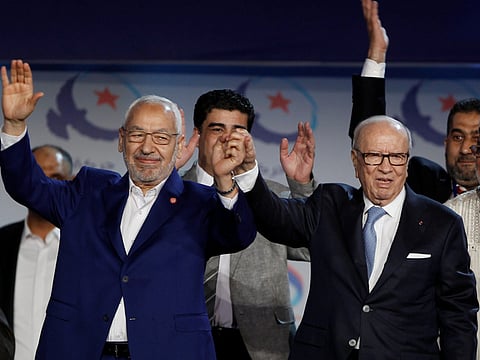Tunisian Islamists Al Nahda move to separate politics, religion
Unlike the Muslim Brotherhood in Egypt, Al Nahda was able to survive in Tunisia despite initial conflict with secularists

Tunis: Tunisia’s Islamist party Al Nahda will separate its political and religious work, its chief said on Friday, moving away from its tradition of political Islam.
Al Nahda was the first Islamist party to come to power in the wake of the 2011 Arab Spring revolutions and it took part in the first government coalition after the overthrow of Tunisia’s autocratic leader Zine Al Abedin Bin Ali.
It won the first post-uprising election by appealing to many Tunisians who saw its Islamist identity as an antidote to the years of corruption and repression under the Bin Ali government in one of the region’s most secular nations.
Free elections, a new constitution and a compromise politics between secular and Islamist parties have helped Tunisia avoid the turmoil seen in several other Arab nations.
“Al Nahda has changed from an ideological movement engaged in the struggle for identity, to a protest movement against the authoritarian regime, and now to a national democratic party,” Ghannouchi told supporters at a rally. “We must keep religion far from political struggles.”
Analysts said Al Nahda’s reform appeared to try to distinguish itself in a region where political Islam has suffered setbacks, and also to prepare for local elections next year and presidential run in 2019.
Unlike the Muslim Brotherhood in Egypt that was toppled by the Egyptian army in 2013 and isolated from political activity, Al Nahda was able to survive despite initial conflict with secularists with whom it eventually shared power.
“Al Nahda benefited and learnt from the regional changes after the Muslim Brotherhood in Egypt, and understood well that there was no future in political Islam,” analyst Jamel Arfaoui said.
“Al Nahda succeeded in shaping a new image for Islamists abroad, but the question remains will it be able to persuade people locally that it has changed.”
Al Nahda, formed as a movement during the Bin Ali years and with many of its leaders imprisoned or exiled during that time, has in the past struggled with internal splits between its more moderate and conservative wings.
A crisis over the murder of two opposition leaders and Al Nahda’s handling of hardline conservative Salafist groups eventually forced the party to step aside during its first government for a caretaker administration in 2014.
Since then, Al Nahda and secularists have made compromise a byword for Tunisian politics after their deal-making pulled the country out of that political confrontation, and allowed Tunisia to approve the new constitution.
Tunisia President Beji Qaid Al Sebsi welcomed the step to separate politics and religious activities, saying that Al Nahda was heading in the right direction. He said the next test for Al Nahda will be local elections in March 2017.
“The state now respects religion and religious freedoms, contrary to the way it was in the past,” he said. “Political movements should be directed toward political competition and serve the people only.”
Sign up for the Daily Briefing
Get the latest news and updates straight to your inbox



